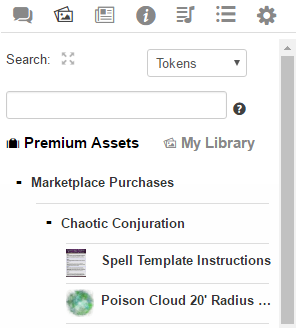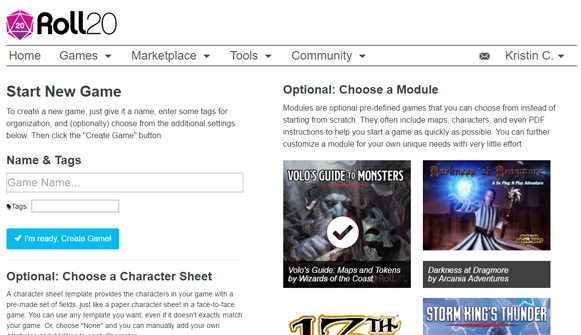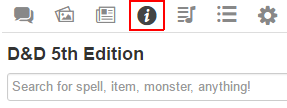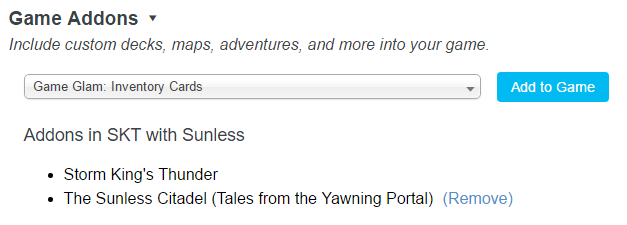How to Access Marketplace Content
From Roll20 Wiki
Page Updated: 2021-11-26 |
Attention: This page is community-maintained. For the official Roll20 version of this article, see the Help Center for assistance: Here .
This wiki page will explain where to find and how to implement all the content that you can purchase from the Roll20 Marketplace.
Art Packs
Art Packs are collections of images for use in your games on Roll20. These packages can include token, maps, tile, and portrait image content. Once purchased, these art packages are unlocked within the tabletop itself. These image sets are available under the Premium Assets section of the Art Library of the Sidebar. Your purchased art is already organized into folders by the art pack's name. These images do not count towards your account's image quota.
If you go to the page, Your Purchases, you can keep track of all the Marketplace items you have already purchased.
Downloadable Content
The artist of a pack can choose to make their pack available to download outside of Roll20. If this option is enabled, there will have a blue Download Complete Set button available on their Marketplace listings. Clicking on this button will download the entire art package as a single compressed ZIP file. The images contained in the ZIP file will be either be in PNG (if transparencies are used) or JPG file formats.
Modules
A Roll20 Module is a fully realized adventure that a GM can pick up and play that does most if not all of the setup work for them. Battle map assembly, NPC creation, Dynamic Lighting drawings, player handouts, and more. All of this is pre-prepared for you inside the module, ready to play. This allows a GM to get right into hosting a game far faster than having to create it all from scratch. Modules are a great way for a brand new GM to jump into playing.
When you purchase a module from the Marketplace, this unlocks the module for use. Create a new game based off of the module by clicking on the Start New Game option from the site menu, the column on the right hand side of the page is titled Optional: Choose a Module. Underneath this are thumbnail tiles for all the various Roll20 modules that are available. For the ones you have purchased, mousing over the thumbnail will make a check mark icon appear over the thumbnail tile. Clicking on the tile will select this module to be used as the base for this new game. If a certain character sheet is recommended for use with this module, it is automatically chosen under the Optional: Choose a Character Sheet section on the left side of the page. When you launch a game with a Module, the encounters, maps and other assets from the module are pre-configured as Pages on the Page Toolbar of the game.
If you mouse over a module thumbnail that you have not purchased yet, a shopping cart icon will appear instead of a check mark. Clicking on this will bring you to that module's Marketplace listing.
If you have multiple modules purchased on your account and have accidentally chosen the wrong one, click on the blue "Change Module" button at the top of the page. This will clear out your module choice and bring up all the Module thumbnails once again.
Downloadable Module Content
Some modules come with PDFs of their adventure or rule books if the Marketplace listing has the phrase "Downloadable PDF" mentioned in the module's listing information. To download the PDF file, go to the Module's marketplace listing and there will be a blue Download PDF button at the bottom of the page.
Free Modules to Try
If you'd like to see how a module works in action, there is a free modules available on the Roll20 Marketplace that works towards familiarizing a gaming group to playing on Roll20 and the D&D 5th Edition RPG.
The Master's Vault: This is a Level 1 adventure that is compatible with the SRD5 Gaming License written by James Introcaso
Compendium Expansions
Compendiums are "books" of indexed webpages devoted to a particular RPG rule system. It behaves, and is designed, very similarly to a mini wiki. A Compendium can be browsed outside of Roll20's VTT, but it also can be used within it for quick rule searches and populating fields on your character sheets like equipment items and spells via drag and drop capability.
Some of Roll20's Free Compendiums are built using a game's OGL SRD (Open Game License System Resource Document). Compendium Extensions that you purchase from the Marketplace adds licensed content from published materials and inserts it into their specific system Compendium for you to browse and utilize in game.
When a Compendium Expansion is bought, the new pages contained in this expansion are made available for that purchaser's account to peruse. If there are pages that have similar versions in the SRD version of the Compendium, these pages are overridden by the pages from the licensed content. For example, you won't have two Bug Bear entries, only the one from the Monster Manual.
Adding a Compendium to your Game
A Compendium can also be utilized within Roll20's tabletop. GMs and players can look up rules on the fly during their game and the GM can take whole entries from the Compendium and drag them to the tabletop to create a handout with the information contained within. If the character sheet in use is Compendium Compatible, the GM and players can drag items, spells, and other abilities from the Compendium into their character sheet to auto-complete elements on it. Monster entries will even create and populate entire NPC Character Journals automatically and come with a linked token (when available from licensed content) when the GM drags its entry to the Tabletop.
Character Sheets must be designed by its author to point to a particular Compendium first before VTT/Compendium functionality is available. For instance, choosing one of the frequently updated D&D 5th Edition character sheets will automatically enable the 5th Edition Compendium to be used in your game as well as Pathfinder sheets enabling the Pathfinder Compendium. You can choose a character sheet at game creation or by going to the Game Settings Page at any time afterwards. If you're on your game's Game Settings Page and want to use your own sheet, you can select the Compendium of your choice by going to the Access Compendium In-Game drop down menu and choosing the Compendium you would like to use. At default, this menu is set to "Determined by Character Sheet (Default)".
Once added, a new tab will be added on the Sidebar placed between the Journal tab and the Jukebox tab. This is the Compendium tab. Browsing and searching for entries within the Compendium Tab behave exactly as the webpage version. The only difference here is that the entries will pop up in their separate window when you select them from the tab.
If you're not relying on a Character Sheet to load a desired Compendium, you'll want to go to the Game Settings Page and choose the Compendium you want to use.
Caveats of Compendium Expansions and User Access
Compendium extensions are account locked. The content is only available to the user who has purchased the product. If you are the GM, your players do not gain access to the Compendium Extension automatically. When a GM drags and drops content from the Compendium into their game to generate a handout (or character entry if this is a creature) of that Compendium page's content, these Journal entries can then be shared among their fellow players.
Game Addons
Addons are smaller chunks of game content that are meant to enhance an existing game. Some examples of Game Addons are custom card decks, maps, single encounter adventures and more. Once bought, these content packages are available via a dropdown menu in the Game Addons section of the Game Details Page. Select the one you wish to add and click on the blue Add to Game button beside the drop down menu. When a Game Addon is appended to the game, it will be added to a bulleted list underneath the "Addon in [Title of Current Game]" list. This list is shown underneath the addon drop down menu and the blue Add to Game button.
| Adding an Addon more than once will overwrite the previous version of that addon you currently have added to your game. You will lose any changes you may have made, but this will also assists a GM who made any edits by mistake and wish to revert back to the original copy of the Addon. |
Removing Addons
To remove any Game Addon content you've added to a game, you will need to delete it manually from inside the launched game. If you ever delete a Game Addon unintentionally, remove the Addon from the Addon List on the Game Details Page, then add it back to the game again.
Bundles
A Bundle is a group of multiple Marketplace items assembled together in a convenient one-time-purchase package. For instance, the Volo's Guide to Monsters Bundle gives you not only the Compendium Expansion, but also an Addon and a Module version of the book's provided battle maps. When you're on a Bundle's marketplace listing, all the available content that comes with it will be listed under the phrase, Bundle Includes These Items:. If there is content that can be download (an image pack or a PDF for example), these will be available on the individual Marketplace item listings rather than on the Bundle's listing page. The access for these individual items will behave exactly in the same fashion for all the item types listed up above.
Marketplace F.A.Q.
The following are some commonly asked questions about Marketplace Purchases.
I purchased a product on the Marketplace. When I go back to the Marketplace, I can purchase the same item again. Is this a Bug?
A feature we added in 2016 was Marketplace Gifting. Now a player can buy their GM products on the Marketplace or vice versa. If you have purchased an item on the Marketplace, the purchase button remains on the listing in case you want to buy it for someone else. When you go to the Purchase Window, the radio button to select "Myself" will be disabled, so you will not run the risk of buying the product more than once for yourself.
My players gifted me with Account Credit. Why can't I use this to buy Marketplace items?
That gifted credit is Subscription Credit to go towards your Roll20 subscription renewal. If a player wants to gift you with Marketplace content, they will need to purchase it in full from the Marketplace listing instead.
I want to gift my GM something from the Marketplace. Can I do that?
Yes! Find the item on the Marketplace and click the Purchase button. When on the Purchase Window, instead of selecting the "Myself" radio button for the purchase recipient, choose either "A Recent Player" (this will bring up a list of users you've recently played with) or "By Email". Then either select your GM from the user list or supply their email. Follow through with payment information as required and once payment is submitted and processed, both you and your gift recipient will be given an email receipt for the purchase.
Something appears to have gone wrong with my purchase, what do I do?
Please Contact Roll20 if you run into any payment or account issues while buying Marketplace items.













